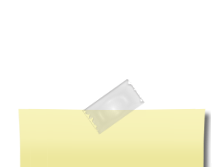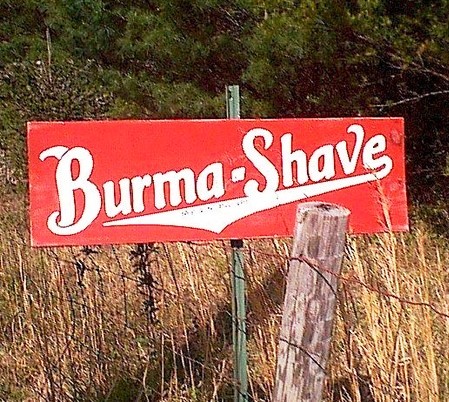Burma Shave
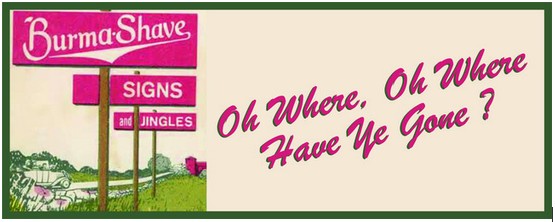
Feeling nostalgic? Now you'll rave!
Here's the story of Burma Shave.
By Martin Waterman
I CAN REMEMBER TAKING A TRIP AS A CHILD AND SEEING MY FIRST BURMA SHAVE SIGNS. Technically speaking, after 1963 all the 7,000 or so sets of signs were supposed to have been taken down. Still, my discovery may not have been unusual, since even today sightings abound (though they're not as frequent as Elvis or Bigfoot sightings). It's possible that some of the thousands of signs that dotted the countryside were never taken down, or perhaps (and more likely) they are the work of some nostalgic farmers who recreated them.
Like many great success stories, Burma Shave started by happenstance. Burma Shave, a brushless shaving cream, was concocted by the Odell family. Its predecessor product, a liniment called Burma Vita, was not doing very well in sales, due to competition and to the fact that it could only be sold to people who were ill. It was suggested that it would be more profitable to market a product that could be used every day, such as Lloyd's Euxesis from England. This was the original brushless shaving cream that was available world-wide. A chemist was hired (Burma-Vita was one of grandfather Odell's homemade concoctions) and after about 300 mixtures were tried, Burma Shave was born.
However, inventing the product was only the beginning of a long journey to success, and the product almost died several times because of poor marketing. One of the marketing schemes was called "Jars on Approval," in which the Odell boys would enter a man's office and give him a jar of Burma Shave on this basis: if he liked the product he would pay them 50¢ the next time they saw him. If he didn't like Burma Shave they would take back the unused portion and "remain friends."
Then one day, Alan Odell came up with a suggestion. He suggested roadside signs like the ones he had seen on road trips when he was out trying to sell Burma-Shave. However, his father would not hear of such a crazy idea, and was sure that the boy was just homesick because of all the travelling he was doing. Alan continued to lobby for his idea and finally his father gave in and gave him $200 to try out his idea.
The year was 1925, and the automobile was becoming more common, and people begun to take to the roads of America. Second-hand boards were purchased, cut into 36-inch lengths, and painted. The original signs did not have a rhyme. Typically, consecutive signs would read:
| Shave the Modern Way No Brush No Lather No Rub-in Big Tube 35 cents Drug Stores BURMA-SHAVE |
Good-Bye! Shaving Brush
Half a Pound for Half a Dollar Very Fine for the Skin Druggist Have It Cheer up Face, the War Is Over BURMA-SHAVE |
The signs were put up in a hurry before the ground froze solid on two roads leading out of Minneapolis. There were about a dozen sets of signs put up on the two roads.
Not too long after that, the first repeat orders for Burma Shave were received from drugstores because the people who travelled the two roads where the signs had been installed began asking for Burma Shave from area drugstores. At this time, the business was broke, so the company was incorporated and 49% of the stock was sold to raise capital. Within three weeks, the shares had been sold, and in early 1926 the first sign shop was set up.
The signs continued to bring success and became more and more humorous. The six consecutive signs, when placed 100 paces apart, created something unique in advertising. Of course, in later years as the roads got better and cars got faster, the size of the signs and the distance between them had to be increased.
The consecutive signs commanded the attention of those reading them longer than any single sign could ever hope to do. The entertaining signs helped make long journeys more entertaining, and people became addicted to reading them.
By having the rhymes build suspense until the fifth sign, Burma Shave forced those reading the signs to focus their attention on reading the full series of signs so that the message could be understood and savored like a good joke. For instance:
|
The Bearded Lady
Tried a Jar She's Nnow A Famous Movie Star BURMA-SHAVE |
Takes the "H" out of Shave
Makes it Save Saves Complexion Saves Time & Money No Brush No Lather BURMA-SHAVE |
|
Every Shaver |
Your Shaving Brush Has had its Day So Why Not Shave the Modern Way with BURMA-SHAVE |
The next year, Allan and his brother Leonard set up more signs, spreading across Minnesota and into Wisconsin, spending $25,000 that year on signs. Orders poured in, and sales for the year hit $68,000.
Eventually, the signs spread to every state, with a few exceptions. No "official" signs appeared in Arizona, New Mexico, or Nevada because of low traffic density. Massachusetts received no signs because winding roads and excessive foliage made it hard to find enough locations to justify placing them there.
The slogans were very powerful, and worked so well that that the Burma Shave Company did not even feel the effects of the Depression. The world's economy may have been depressed, but men still had to shave.
| Does your Husband Misbehave Grunt and Grumble Rant and Rave Shoot the Brute Some BURMA-SHAVE |
If Harmony Is What You Crave Then Get A Tuba BURMA-SHAVE |
| The 50 cent Jar So Large by Heck Even the Scotch Now Shave the Neck BURMA-SHAVE |
It's a good old Spanish Custom Take your Mug And Brush And Bust ’em BURMA-SHAVE |
| ’mid Rising Taxes Soaring Rents Still Half a Pound For Fifty Cents BURMA-SHAVE |
You've Laughed at our Signs For many a Mile Be a Sport Give Us a Trial BURMA-SHAVE |
|
Late Risers!
Shave in Just 2 Minutes Flat Kiss your Wife Grab your Hat BURMA-SHAVE |
You'll Love your Wife You'll Love her Paw You'll even Love Your Mother-in-law If You Use BURMA-SHAVE |
The rhymes aimed at motivating potential purchasers of Burma Shave were not just cute, but were probably some of the best advertising slogans ever written. Some of them suggested to men that they would do better with the women if they used Burma Shave:
| She Eyed his Beard And said No Dice The Wedding's Off I'll Cook the Rice BURMA-SHAVE |
A Chin where
Barbed Wire Bristles Stand Is Bound to be A No Ma'ams Land BURMA-SHAVE |
| Use this Cream A Day or Two Then Don't Call Her — She'll Call You BURMA-SHAVE |
Romances are Wrecked Before They Begin By a Hair on the Coat Or a Lot on the Chin BURMA-SHAVE |
| Before I Tried It The Kisses I Missed But Afterwards -- Boy! The Misses I've Kissed BURMA-SHAVE |
If You Want A Hearty Squeeze Get our Female Anti-Freeze BURMA-SHAVE |
| Grandpa Knows It Ain't Too Late He's Gone to Git Some Widder Bait BURMA-SHAVE |
He asked his Kitten To Pet and Purr She Eyed his Puss And Screamed "What Fur!" BURMA-SHAVE |
At their height of popularity there were 7,000 Burma-Shave signs stretching across America. They became such an icon to these early day travelers that families eagerly anticipated seeing the rhyming signs along the roadway, with someone in the car excitedly proclaiming, "I see Burma-Shave signs!” Breaking up the monotony of long trips, someone once said, "No one could read just one."
Not overlooking the spending power and influence of women, Burma-Shave put up rhymes to lure them to purchase BURMA-SHAVE for the men in their lives or to demand smoother cheeks:
| A Christmas Hug A Birthday Kiss Awaits the Woman Who Gives This BURMA-SHAVE |
"At Ease," She Said
"Maneuvers Begin When You Get those Whiskers Off Your Chin" BURMA-SHAVE |
| 6 Million Housewives Can't Be Wrong Who Keep Their Husbands Right along In BURMA-SHAVE |
At Xmas Time And Birthdays Too We Solve Your Problems Right for You – Give BURMA-SHAVE |
| Broken Romance Stated Fully She Went Wild When He Went Wooly BURMA-SHAVE |
His Cheek was Rough
His Chick Vamoosed And Now She Won't Come Home to Roost BURMA-SHAVE |
| His Tenor Voice She Thought Divine Till Whiskers Scratched Sweet Adeline BURMA-SHAVE |
If a Gift You Must Choose Give Him One He'll Like to Use BURMA-SHAVE |
Others slogans suggested that there was no better product or substitute for Burma-Shave:
|
Substitutes
Another Red Skin |
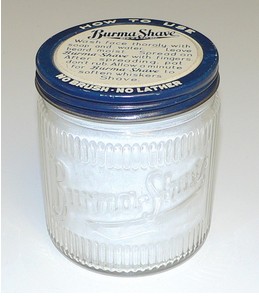 |
Avoid the Store
Here's the Winning |
| I'd Heard It Praised By Drug Store Clerks I Tried the Stuff Hot Dog! It Works BURMA-SHAVE |
A Shave That's Real No Cuts to Heal A Soothing Velvet After-Feel BURMA-SHAVE |
| Give the Guy The Toe of Your Boot Who Tries to Hand You A Substitute BURMA-SHAVE |
Half A Buck Half A Pound No Substitute Is Ever Found For BURMA-SHAVE |
World War II was not ignored by the Burma-Shave writers—not on its road signs nor in magazines and newspapers.
| 5-Star Generals Privates 1st Class Show Equal Rank In The Looking-Glass BURMA-SHAVE |
Let's Make Hitler and Hirohito Look As Sick As Old Benito Buy Defense Bonds BURMA-SHAVE |
| Shaving Brush In Army Pack Was Straw That Broke The Rookie's Back Use Brushless BURMA-SHAVE |
The Draftee Tried A Tube And Purred Well Whaddya Know I've Been Defurred BURMA-SHAVE |
| Soldier, Sailor And Marine Now Get A Shave That's Quick And Clean Burma- Shave |
Maybe You Can't shoulder A Gun But You Can Shoulder The Cost Of One Buy Defense Bonds BURMA-SHAVE |
| To Most Brush Shavers It's Quite Clear The Yanks Aren't Coming The Yanks Are Here Use Brushless BURMA-SHAVE |
Buying Defense Bonds Means Money Lent So They Don't Cost You One Red Cent BURMA-SHAVE |
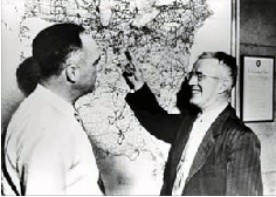 Top: Alan Odell Shows a map of the U.S.,locating Burma-Shave signs. c. 1945
Right: The Odell Family c.1944 |
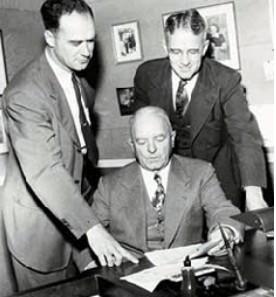 |
One big reason the advertising campaign was so successful is that Burma-Shave would not put up any signs that offended anyone. Some of the signs showed a measure of humility:
| Though We've OutSold Six Million Others We Still Can't Beat Those Cough Drop Brothers BURMA-SHAVE |
If Our Road Signs Catch Your Eye Smile But Don't Forget To Buy BURMA-SHAVE |
| Listen Birds These Signs Cost Money So Roost Awhile But Don't Get Funny BURMA-SHAVE |
The Millionth Man Has Joined Our Ranks of Happy Shavers Many Thanks! BURMA-SHAVE |
|
This is Not |
Our Fortune |
|
Every Day |
He Always Used |
Although the Burma-Shave Company prospered, there were many challenges, too. Not only was there fierce competition, there was also the need to come up with a continuous supply of superior verses. The company solved that with an annual contest that paid $100 for each verse used. There were thousands of entries sent in, resulting in many rhymes of high quality. Judging the entries eventually became difficult because in some years there would be more than 50,000 entries. This forced Burma-Shave to hire advertising copywriters to help in the selection process.
With the trend toward more automobiles and more roads, the traffic accident rate began to climb. In response, the company created some slogans stressing traffic safety. In fact, some of the best Burma-Shave rhymes were written with public service in mind:
| When You Drive If Caution Ceases You Are Apt To Rest in Pieces BURMA-SHAVE |
These Three Prevent Most Accidents Courtesy, Caution Common Sense BURMA-SHAVE |
| Little Bo-Peep Has Lost her Jeep It Struck a Truck When She Went to Sleep BURMA-SHAVE |
Is He Lonesome Or Just Blind This Guy Who Drives So Close Behind? BURMA-SHAVE |
| Schoolhouses Take It Slow Let The Little Shavers Grow BURMA-SHAVE |
If Hugging on Highways Is your Sport Trade in your Car For A Davenport BURMA-SHAVE |
Still other good examples include
|
Many a Forest |
Don't Lose your Head |
| Train Wrecks Few Reason Clear Fireman Never Hugs Engineer BURMA-SHAVE |
The Safest Rule No Ifs or Buts Just Drive Like Every One Else Is Nuts! BURMA-SHAVE |
|
The Minutes |
If You Pass On the Yellow Line Hope the Funeral's Yours Not Mine BURMA-SHAVE |
There are some funny stories in the history of the Burma-Shave Company. In Los Angeles, free sample jars were handed out to men as they entered a wrestling match. However, when one of the wrestlers angered the crowd, some of them started to throw their jars into the ring. Fortunately (and probably miraculously) no one was hurt . . . a close shave for the company, so to speak.
A similar occurrence happened at Ebbets Field in New York. Tubes of Burma-Shave were handed out to fans entering the game, but when the umpire made a call unfavorable to the Dodgers, he was pelted with the tubes. The game had to be interrupted until the groundskeepers could remove the tubes.
Another problem that arose was that the Burma-Shave signs had a tendency to disappear near college towns. To remedy this, special bolts were used, so that a special tool was necessary to unbolt the signs, and the posts had crosspieces attached to the bottoms to act as anchors.
Another problem in rural areas was the tendency for hunters to use the signs for target practice. Some destruction was also caused by small animals that seemed to like to chew on the signs. However, much more damage was attributed to horses that found them to be an ideal height for back scratching. A cow or horse would maneuver itself beneath the bottom edge of a sign and then begin to scratch the itch. This would often result in a broken sign. The problem was solved when many of the signs were raised to ten feet high.
Still another problem occurred when the Burma-Shave Company tried to mock the rising trend of coupon advertising with the following rhyme:
| Free Offer! Free Offer! Rip A Fender Off Your Car Mail It In For A Half-Pound Jar BURMA-SHAVE |
Fenders began to arrive in the mail and by express, and local people scavenged the Minnesota junkyards and brought in fenders. Some fenders from toy cars also came in, and without exception, everyone who brought or sent in a fender received a free half-pound jar of BURMA-SHAVE. Of course, the publicity from the bumper offer was priceless and further helped to establish the company as part of America's roadside culture.
Perhaps the company went too far with the following rhyme spoofing science fiction and curiosity about outer space:
| Free - Free A Trip to Mars For 900 Empty Jars BURMA-SHAVE |
The manager of a supermarket in Appleton, Wisconsin, took up the challenge and wrote to the company asking where he should send the 900 jars for his free trip. The company sent back the following reply: "If a trip to Mars you'd earn, remember, friend, there's no return."
In reply, the enterprising supermarket manager accepted. He turned the project into a fantastic promotion for Burma-Shave that had children and adults swarming the supermarket. The promotion included no less than a rocket plane on display and little green men on the roof firing toy rocket gliders into the parking lot.
The Burma-Shave company decided to send the manager and his family to Mars. The real destination was to be Mars, Germany. (Even though it is spelled Moers, it is pronounced Mars.) Again, the publicity was enormous, especially when the manager showed up wearing a silvery space suit and a bubble on his head. The company, of course, provided him with extra jars of Burma-Shave so that he could barter with the Martians.
It is said that all good things must come to an end, and this was the case with BURMA-SHAVE. There were a number of factors that led to the decline of the product. After World War II, increasing costs and decreasing sales began to be felt by the company. People were travelling faster on the highways and times were changing. The signs just weren't working as well anymore, and the company started to advertise more with other media.
The real end to the roadside rhymes came in 1963, when the company was sold to Phillip Morris to become an operating division of American Safety Razor Products. The decision was made to remove all the signs as soon as possible, especially since any remaining signs would mean that rent money would still be owed to farmers. The end of the signs was popular fodder for the news media, and many stories were written about the demise of this American institution. A set of signs was donated to the Smithsonian Institution to preserve this part of Americana. Here are two of them:
|
Shaving Brushes |
Within This Vale |
BURMA-SHAVE sales rose to about 6 million by 1947, but sales stagnated for the next seven years, and then gradually began to fall. Various reasons caused sales to fall, the primary one being urban growth. Typically, BURMA-SHAVE signs were posted on rural highways and higher speed limits caused the signs to be missed or ignored. Subsequently, the Burma-Vita Company was sold to Gillette in 1963, which in turn became part of American Safety Razor, which was then part of Phillip Morris. The huge conglomerate decided the paying rent to farmers who displayed the signs was an unecessary expense for a silly idea - and another of America’s vintage icons was lost to progress.
Most of them may be gone now, but they're not forgotten.
Here's one more that's just as true today as it was back then.
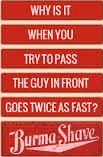
To see many more of the Burma Shave slogans that were used,
and how they changed over the years, click on the sign below.
